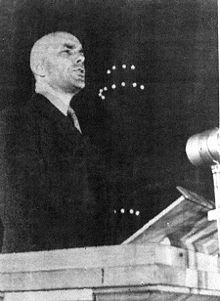Zygmunt Berling
| Zygmunt Henryk Berling | |
|---|---|

General Zygmunt Berling
|
|
| Born |
27 April 1896 Limanowa |
| Died | 11 July 1980 (aged 84) |
| Allegiance |
|
| Service/branch |
People's Army of Poland |
| Years of service | 1914 - 1953 |
| Rank | Lieutenant General |
| Unit | Polish Legions |
| Commands held | 6th Infantry Regiment 4th Infantry Regiment 1st Tadeusz Kościuszko Infantry Division First Army |
| Battles/wars | |
| Awards | Virtuti Militari |
Zygmunt Henryk Berling (27 April 1896 – 11 July 1980) was a Polish general and politician. He fought for the independence of Poland in the early 20th century. During the Second World War, he was sentenced to death in absentia for desertion from the Polish Army of General Władysław Anders. The verdict was overruled by the Polish government-in-exile. Later, he became the commander of the 1st Polish Army, part of the Polish Army in the USSR, and played an important role in the post-war Polish government.
Zygmunt Berling was born in Limanowa on 27 April 1896, (Some researchers think Berling to be from German or Swedish Calvinist roots. Berling himself gave Judaism as his religious affiliation in school surveys. ). He joined the Polish Legions of Józef Piłsudski in 1914, serving in the 2nd and 4th Legions Infantry Regiment (Pułk Piechoty Legionów). Between the "oath crisis" of June 1917 and October 1918 he served in the Austro-Hungarian Army. At the end of the First World War he joined the reborn Polish Army, becoming the commander of an infantry company in the 4th Infantry Regiment. During the Polish-Soviet War he gained fame as an able commander during the Battle of Lwów, and received the Virtuti Militari medal for his leadership.
...
Wikipedia
